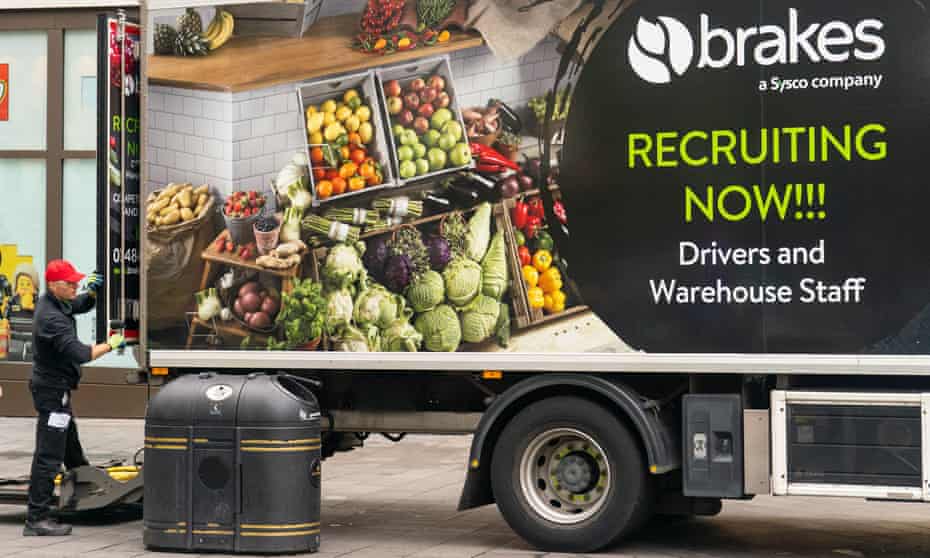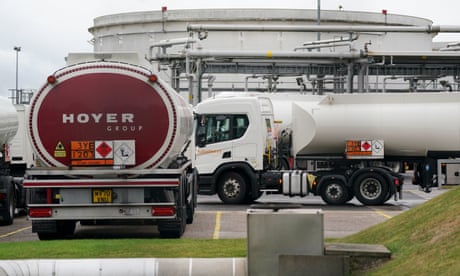WAIT, WHAT
Just 20 UK visas issued to foreign lorry drivers, government admits
Oliver Dowden says applications ‘relatively limited’ for emergency visa scheme aimed to stem supply chain crisis

An advert for drivers and warehouse staff is displayed on the side of a lorry as a driver makes a delivery in central London. Photograph: Dominic Lipinski/PA
Aubrey Allegretti
@breeallegretti
Wed 13 Oct 2021
Just 20 UK visas have been issued to HGV drivers from abroad who took up the emergency offer of employment to avoid empty shelves in the run-up to Christmas, a senior minister has admitted.
Oliver Dowden, the Conservative party chair, said there were a “relatively limited” number of people applying for the jobs, with about 300 applications received and “just over 20” fully processed.
It came as the Home Office disclosed it would take three weeks to process the documents, in accordance with “the public service standard” turnaround time of 15 working days. The admission, from Kevin Foster, future borders and immigration minister, was contained in a letter to MPs, seen by the Guardian, and prompted accusations that the government was not moving fast enough to avert a national crisis.

EU lorry drivers will not help Britain ease its fuel crisis, union says
In the face of mounting fuel, food and goods shortages last month, it was announced that 5,000 visas would be granted to lorry drivers until the end of next February, and a further 5,500 could be applied for by poultry workers that would last until 31 December 2021.
Dowden told LBC on Wednesday: “We have 300 people that have applied for these [HGV] visas. I believe the number is just over 20 that actually received them, so are on the road. But I expect that number to increase over time.”
Foster suggested the recruitment drive was not yet fully under way. He said the Home Office was “currently making the necessary changes” to immigration rules, adding that the Department for Environment, Food and Rural Affairs (Defra) was “standing up the operators to begin recruitment”.
The Liberal Democrats raised concerns there would be little time left for those taking up the roles to make a significant improvement to the UK’s supply chain struggles.
Alistair Carmichael, the party’s home affairs spokesperson, said the lack of progress was “staggering”, especially in light of reports that the UK’s biggest container port, Felixstowe, was being forced to turn away ships from Asia because of a backlog of containers caused by the lorry driver shortage. He said: “In the face of a national crisis and our ports going into gridlock, the response from Conservative ministers is too little, too late. This incompetence will mean more empty shelves and more misery for British consumers in the run-up to Christmas.”
Ministers were reluctant to approve more emergency visas for workers to stem the HGV driver crisis because they were trying to put more pressure on the industry to improve pay and conditions, rather than being seen to bail it out by providing an influx of labour from abroad.
Meanwhile, shortages of other workers are having a significant impact. The poultry worker visas were issued as healthy pigs began to be culled because of a lack of staff at abattoirs, leaving as many as 120,000 pigs stranded on farms long after they should have been slaughtered. And the army had to be called in to help with fuel deliveries after the HGV driver shortage affected some companies, causing mass panic buying.
Aubrey Allegretti
@breeallegretti
Wed 13 Oct 2021
Just 20 UK visas have been issued to HGV drivers from abroad who took up the emergency offer of employment to avoid empty shelves in the run-up to Christmas, a senior minister has admitted.
Oliver Dowden, the Conservative party chair, said there were a “relatively limited” number of people applying for the jobs, with about 300 applications received and “just over 20” fully processed.
It came as the Home Office disclosed it would take three weeks to process the documents, in accordance with “the public service standard” turnaround time of 15 working days. The admission, from Kevin Foster, future borders and immigration minister, was contained in a letter to MPs, seen by the Guardian, and prompted accusations that the government was not moving fast enough to avert a national crisis.

EU lorry drivers will not help Britain ease its fuel crisis, union says
In the face of mounting fuel, food and goods shortages last month, it was announced that 5,000 visas would be granted to lorry drivers until the end of next February, and a further 5,500 could be applied for by poultry workers that would last until 31 December 2021.
Dowden told LBC on Wednesday: “We have 300 people that have applied for these [HGV] visas. I believe the number is just over 20 that actually received them, so are on the road. But I expect that number to increase over time.”
Foster suggested the recruitment drive was not yet fully under way. He said the Home Office was “currently making the necessary changes” to immigration rules, adding that the Department for Environment, Food and Rural Affairs (Defra) was “standing up the operators to begin recruitment”.
The Liberal Democrats raised concerns there would be little time left for those taking up the roles to make a significant improvement to the UK’s supply chain struggles.
Alistair Carmichael, the party’s home affairs spokesperson, said the lack of progress was “staggering”, especially in light of reports that the UK’s biggest container port, Felixstowe, was being forced to turn away ships from Asia because of a backlog of containers caused by the lorry driver shortage. He said: “In the face of a national crisis and our ports going into gridlock, the response from Conservative ministers is too little, too late. This incompetence will mean more empty shelves and more misery for British consumers in the run-up to Christmas.”
Ministers were reluctant to approve more emergency visas for workers to stem the HGV driver crisis because they were trying to put more pressure on the industry to improve pay and conditions, rather than being seen to bail it out by providing an influx of labour from abroad.
Meanwhile, shortages of other workers are having a significant impact. The poultry worker visas were issued as healthy pigs began to be culled because of a lack of staff at abattoirs, leaving as many as 120,000 pigs stranded on farms long after they should have been slaughtered. And the army had to be called in to help with fuel deliveries after the HGV driver shortage affected some companies, causing mass panic buying.
No comments:
Post a Comment